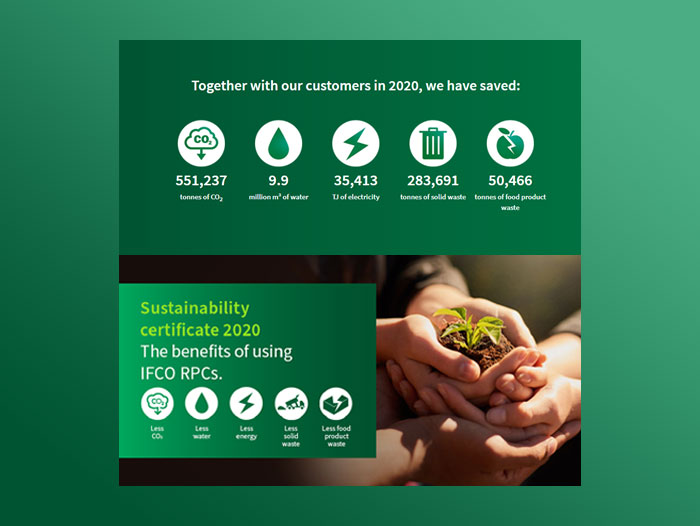IFCO Presents Sustainability Certificate to Retailers and Growers For the Fourth Consecutive Year
January 27, 2021 | 4 min to read

Munich, Germany: IFCO, the world’s leading provider of Reusable Plastic Containers (RPCs) for fresh food, is awarding its annual Sustainability Certificate in Europe and North America for the fourth year in a row, acknowledging the sustainability efforts of retailers and growers. IFCO is a pioneer in driving supply chain sustainability with its business model based on the concept of circular economy, enabling more than 551,000 tons of CO2 emission savings by using IFCO RPCs in 2020. This makes IFCO one of the most sustainable logistics and packaging companies worldwide. Therefore, being acknowledged by IFCO shows companies’ commitment towards environmental protection and together making supply chains more sustainable. IFCO introduced its sustainability certification initiative in September 2018, when retailer customers in Europe and North America were acknowledged for the first time for their sustainability efforts in 2017.
Evidence of retailers’ and growers’ environmental commitment
Customers’ attention towards environmental and climate protection has been steadily increasing over the past years, resulting in a strong focus on sustainable products and business practices. Valuing the increased demand for environmentally friendly products and processes helps retailers and growers to stand out from the competition and to increase their customers’ loyalty. Therefore, IFCO presents its Sustainability Certificate as evidence of their environmental commitment. As not only customers but also company shareholders are increasingly paying attention to corporate sustainability goals, holding IFCO’s Sustainability Certificate is a clear demonstration of environmentally friendly behavior to customers and shareholders alike.
“Many retailers and growers are working hard to make their supply chains more sustainable and to reduce their environmental footprint. To honor these great efforts and to provide reliable evidence of all the measures taken to customers and shareholders, we are presenting our Sustainability Certificate to companies in the retail and grower industry. The certificate shows that the certificate holders are taking clear measures to make supply chains more sustainable and to protect the environment. Being able to show this commitment to customers and business partners is a decisive factor for business success”, explains Michael Pooley, CEO at IFCO SYSTEMS.
As the use of RPCs makes a meaningful contribution to environmental protection, IFCO shares these achievements with its customers by presenting the Sustainability Certificate to them since 2018 for their efforts in the year before. Each retailer and grower customer will receive a certificate highlighting the amount of carbon dioxide, water, energy, solid waste, and food waste avoided by utilizing IFCO RPCs in its supply chain. These savings are based on IFCO’s energy and resource savings estimate1 2 3.
17 to 20 percent more energy and water savings as well as CO2, solid and product waste reduction since the start of the initiative
IFCO is constantly monitoring the environmental benefits generated by its logistics concept, the IFCO SmartCycleTM, which is based on the principle of “share and reuse” and thus reduces the ecological footprint of companies’ supply chains. In 2020, IFCO customers saved between 17 and 20 percent more water, energy, CO2 emissions as well as solid and product waste than in 2017, the first year the certificate was presented to retailers. That is possible because all IFCO RPCs are reused between 30 and 120 times during their lifetime, and at every cycle are put through a rigorous cleaning and inspection process before being delivered for the next cycle. Damaged RPCs that cannot be repaired are 100% recycled and used for the production of new IFCO RPCs. Several studies have proven that the use of RPCs leads to savings in terms of CO2 (up to 60%), energy (64%), water (80%), solid waste (up to 86%), and food product damage (up to 96%), when compared with single-use packaging.
IFCO is constantly monitoring the environmental benefits generated along the SmartCycleTM. In Europe and North America, IFCO business enabled the following savings in 2020:
- 551,237 tons of CO2, equivalent to 301,643 fewer cars on the road in a year
- 9.9 million cubic meters of water, equivalent to over 223 million five-minute showers
- 35,413 terajoules of electricity, enough to power over 18.6 million light bulbs for a year
- 283,691 tons of solid waste, equivalent to the trash produced by 209 million individuals per day
- 50,466 tons of food product waste, equivalent to 84 million average meals in the world.
These benefits carry through to IFCO customers’ supply chains and represent a significant achievement for companies wanting to protect their fresh products while still being committed to improving their sustainability performance.
_____________
1“Carbon Footprint of Food Packaging” by Stiftung Initiative Mehrweg (SIM) – The Foundation for Reusable Systems and conducted by the Fraunhofer Institute for Building Physics (IBP) in accordance with the international standards on Life Cycle Assessment (LCA) ISO 14040/44, – Critical review by DEKRA. February 2018.
2“Determination of spoilage levels of fresh fruit and vegetables according to the type of packaging” by Stiftung Initiative Mehrweg (SIM) – The Foundation for Reusable Systems and conducted by Fraunhofer Institute for Logistics and Material flow. May 2013
3“Comparative life cycle assessment of reusable plastic containers and display- and non-display-ready corrugated containers used for fresh produce applications” LCA commissioned by IFCO and conducted by Franklin Associates, Peer reviewed by panel members (BAMAC, Ltd., and University of Michigan, Center for Sustainable Systems) in accordance with the international standards on Life Cycle Assessment (LCA) ISO14040/14044, February 2017
